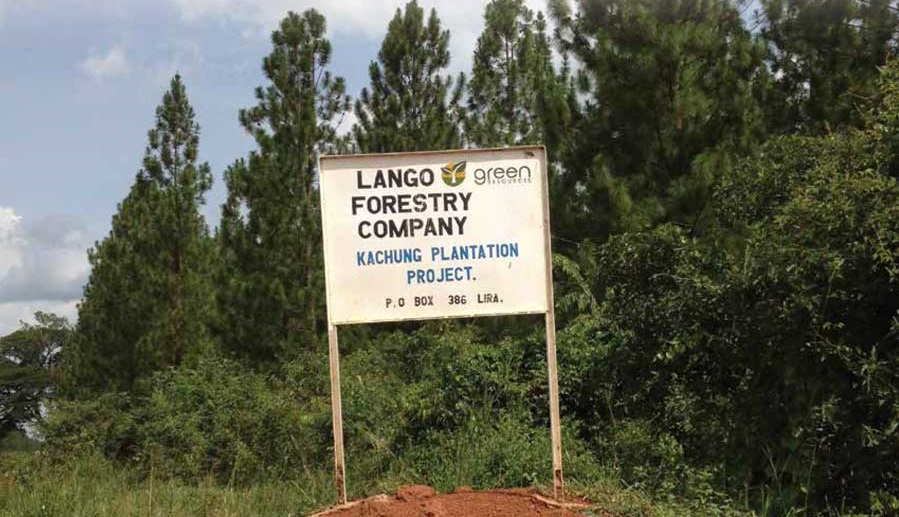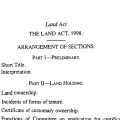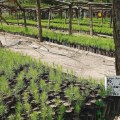WITNESS RADIO MILESTONES
Sweden postpones carbon payment to Uganda tree farm where locals have been evicted
Published
6 years agoon

A planned disbursement of SEK 10 million by the Swedish Energy Agency (SEA) for emissions reductions produced by the Kachung plantation in Uganda, owned by the Norwegian company Green Resources, has been delayed due to on-going concerns about the project. Development Today has learned that the Swedes were about to give a green light last week but put on the brakes.
The delay coincides with the publication of the Berkley-based Oakland Institute’s third critical report on the Kachung plantation. Entitled “Evicted for Carbon Trading,” the report was released last Thursday (August 29), and presents evidence that farmers have over the years been evicted by Green Resources and its Ugandan subsidiaries to make room for the plantation. It also raises questions about the validity of certification received by the project from three international bodies, including the Forest Stewardship Council and CDM.
Ola Westberg at the Swedish Energy Agency tells Development Today that the payment delay is not related to Oakland’s report, which the agency rejects out of hand.
“As far as we can see the report contains no new information and the conclusions arrived at by Oakland do not match those of the independent audit that we have implemented,” the agency writes in a statement released one day after the Oakland report was published.
Rather, the delay is related to the Swedish Energy Agency’s own assessment of the project, Westberg says.
The Swedish agency had planned for a transfer last week of certified emissions credits produced by the Kachung plantation in Uganda and approved by the UN’s Clean Development Mechanism – equivalent to 192,000 tonnes of CO2.
“The plan was to go through with the transfer last week,” says Ola Westberg at the Swedish Energy Agency to Development Today. Once the credits are transferred, the agency has 30 days to pay SEK 10 million to Green Resources, which owns the plantation. Westberg says the agency is “still reviewing the progress report from Green Resources. [The transfer] could happen any day, but probably not this week … There will be no transfer of certified emissions credits until the agency is satisfied.”
PAYMENT SCHEDULE
The plantation, located in Northern Uganda, is surrounded by 17 villages. Though the land being used by Green Resources to plant pine trees is formally owned by the government, thousands of people have used the area for farming and cattle grazing. While the company plans to earn SEK 35 million by selling carbon credits to the Swedish state, the treatment of people in the area has been at the heart of the controversy that has dogged this project for almost a decade.
Back in 2011, the Swedish Energy Agency signed a SEK 35 million agreement with Green Resources for the purchase of 365,000 tonnes of carbon emissions reductions from the company’s pine plantation in Kachung, Northern Uganda. The payments would be made over a 20-year period, with the first disbursement of SEK 1.2 million taking place in 2013.
According to the agreement’s payment schedule, a second disbursement for emissions reductions achieved during the five-year period (2013-2017) was to be made last year.
But the cooperation was frozen in 2015 when media reports and the energy agency’s own site visits revealed that the situation of affected people was worse than Green Resources had led the agency to believe. The agency stated in a press release at the time that “villagers were deprived of vital resources and experienced threats and violence, and there is a lack of clarity regarding ownership in the reserve.”
Following the freeze in 2016, Green Resources presented a road map detailing how it would improve its dealings with communities affected by the plantation. This included a ten-point action plan on areas like food security, water availability, cattle grazing and roads. The Swedish agency welcomed the move, but warned that future carbon payments were “conditional on the implementation of concrete actions to improve the situation.”
The agency stated: “We believe we can do more for local people by taking responsibility and making demands on Green Resources … than by pulling out of the project.”
AUDITS
Since then, the Swedes have called for two independent audits – one published in March 2017 and the other in November 2018, both carried out by the South African consultancy EOH– to assess Green Resources’ progress on the ten points in the action plan. The first audit was largely positive, but found that “no significant actions” had been taken to boost agricultural land productivity, diversify income-generating activities and improve food security. It also referred to several ongoing court cases related to land ownership disputes, urging the company to find a solution “as soon as possible.”
Development Today has obtained a copy of the second EOH audit. It points to numerous shortcomings: “Food security, ineffective communication … complaints from communities associated with corruption, land-rights issues, as well as community access to forest resources” are areas of significant concern. Green Resources is deemed by the consultants to be “partially compliant or non-compliant” on a range of key interventions. “Most … lack specific measurable key performance indicators,” making it difficult to assess compliance. In spite of a commitment to undertake road maintenance after the rainy season, “no firm plans for this are in evidence as yet.” The consultants found “no water quality monitoring data for the current year [or] … a planning schedule for natural water point rehabilitation interventions.” Moreover, the EOH report states, “the provision of health centre support and provision of drug supplies to these facilities has seemingly not been undertaken for the 2018 period.”
Westberg says Green Resources has made improvements in several areas since the 2018 audit, but that the Swedish Energy Agency is still assessing the progress.
OAKLAND INSTITUTE REPORT
The Oakland Institute’s latest report on Kachung criticises the EOH audit from 2017, which stated that “no person had been displaced or evicted” and that the company did not acquire “Kachung land forcefully.” Oakland’s report includes facsimiles of eviction notices signed by Green Resources’ Ugandan subsidiaries. “The eviction notices and letters released with this report make it clear that [EOH]’s claims are false,” Oakland writes.
The authors also take to task the most recent certification by the Forest Stewardship Council, which took place in May 2019. Oakland questions FSC’s claim that that there are no “current unresolved disputes over tenure and use rights,” and there are “effective dispute and grievance procedures that is accepted in the community.”
Commenting on the eviction notices, Westberg does not dispute that evictions took place. The plantation is on national forest reserve land where people are not permitted to live, he says: “Compare it with the situation in Sweden and Norway. What would happen if someone settled in our national forest reserve? That would also be against the law. There are laws there as well as up here in Scandinavia. That is how I made sense of it.”
The Swedish agency states that it invited Oakland Institute to have dialogue and to participate in the investigation of the project on-site in Uganda, but Oakland has declined.
Asked why they did not participate in SEA’s investigation, Anuradha Mittal, Executive Director of Oakland Institute, says to Development Today: “It is very obvious that what the people of Kachung need is not another audit. What they need is true action from the Swedish Energy Agency to stop facilitating this land grab by Green Resources and effectively address the issues and problems communities face as a result of the project.”
Green Resources has funding from two Nordic development finance institutions, Norfund and Finnfund.
Rasi Rajala, Communications Director at Finnfund, says he appreciates Oakland Institute’s concern for smallholder farmers in Uganda. “We encourage them to visit the Green Resources plantation and discuss more closely with the local team there. As for their latest report, it does not appear to contain any substantial new information,” he says.
Like the Swedish Energy Agency and Finnfund, Norfund finds there to be “limited new information” in the Oakland report. “We have no reason to doubt that the audits conducted by FSC and other auditors have been of a high standard,” Inger Nygaard, Communications Manager at Norfund, says.
SWEDEN POSTPONES CARBON PAYMENT TO UGANDA TREE FARM WHERE LOCALS HAVE BEEN EVICTED/Frontpage September 05, 2019
Related posts:

 Two EU member states, Norway named for aiding land eviction for carbon credit trading
Two EU member states, Norway named for aiding land eviction for carbon credit trading
 This Fraud Must Stop’: How a Green Norwegian Company is Using Climate Change to Exploit Ugandan Villages
This Fraud Must Stop’: How a Green Norwegian Company is Using Climate Change to Exploit Ugandan Villages
 The Land Act 1998: Uganda’s 20 year old gambling to Land Ownership
The Land Act 1998: Uganda’s 20 year old gambling to Land Ownership
 A Norwegian company is committing carbon violence in Uganda – Report
A Norwegian company is committing carbon violence in Uganda – Report
You may like
WITNESS RADIO MILESTONES
Top 10 agribusiness giants: corporate concentration in food & farming in 2025
Published
3 weeks agoon
June 19, 2025
Today a handful of agribusiness corporations have consolidated unprecedented control over the world’s food supply, with devastating consequences for farmers, consumers and the planet. A new report by ETC Group and GRAIN examines the state of corporate concentration in six sectors critical to agriculture: commercial seeds, pesticides, synthetic fertilisers, farm machinery, animal pharmaceuticals and livestock genetics.
Corporate consolidation is increasing in most of these sectors and four of them– seeds, pesticides, agricultural machinery and animal pharmaceuticals– now meet the definition of an oligopoly, in which four companies control more than 40% of a market. Concentration can be even higher at the national level, as is the case with synthetic fertilisers.
Top findings from the report include:
- Oligopolies dominate key sectors: Bayer, Corteva, Syngenta, and BASF control 56% of the global commercial seeds market, and 61% of the pesticides market.
- Profiteering amid global crises: Agribusiness giants have exploited crises like the Ukraine war and the COVID-19 pandemic to inflate prices. Fertiliser companies, for instance, saw revenues soar by 57% from 2020 to 2023, with some accused of price gouging.
- Digital and biotech expansion: Corporations are rapidly integrating AI, gene editing, and digital platforms into agriculture through partnerships with Big Tech companies. These technologies enable data extraction from farmers, facilitate carbon credit schemes, and tighter control over food systems—while raising concerns about biosafety, privacy, and corporate monopolies.
Source: grassrootsonline
Related posts:

 A corporate cartel fertilises food inflation
A corporate cartel fertilises food inflation
 Food inflation: The math doesn’t add up without factoring in corporate power
Food inflation: The math doesn’t add up without factoring in corporate power
 African governments are giving in to corporate pressure and undermining local seed systems – report
African governments are giving in to corporate pressure and undermining local seed systems – report
 The United Nations Food Systems Summit is a corporate food summit —not a “people’s” food summit
The United Nations Food Systems Summit is a corporate food summit —not a “people’s” food summit
WITNESS RADIO MILESTONES
Land grabbers evict 360,000 Ugandans in 2024
Published
8 months agoon
November 20, 2024
A staggering 363,021 Ugandans were displaced due to forced land evictions between January and June 2024, according to a new report by Witness Radio Uganda.
The report documented 90 cases of land evictions during this period, with nearly four incidents occurring weekly, affecting over 15,126 people and threatening 5,060 hectares of land nationwide.
The Central region was the epicenter, recording 52 eviction cases, followed by 24 in the Western region, eight in the Northern region, and six in the Eastern region. Alarmingly, the report estimated that 2,160 Ugandans face eviction daily, with 723 hectares of land at risk of being grabbed every day.
VIOLENCE AND HUMAN RIGHTS VIOLATIONS
Despite government promises and directives from President Museveni to halt evictions, land grabbers have routinely ignored these orders, often resorting to violence. Armed security forces, private militias, and police were reported to have carried out the majority of the evictions.
Of the reported cases, 37 were enforced by armed gangs on behalf of evictors, 25 involved Uganda Police, five were carried out with the participation of UPDF soldiers, and four were linked to private security companies.
“The egregious levels of impunity exhibited by land grabbers have left communities defenseless, creating an environment where their human rights are trampled without consequence,” said Jeff Wokulira Ssebaggala, country director of Witness Radio Uganda.
He called for accountability and justice, warning that the unchecked power of influential individuals and entities leaves marginalized communities vulnerable and without recourse.
DRIVERS OF EVICTIONS: INDUSTRIALIZATION AND LAND-BASED INVESTMENTS
The report identified the government’s push for industrialization and land-based investments as the primary drivers of forced evictions. Land is increasingly targeted for oil and gas extraction, mining, agribusiness and tree plantations for carbon offsets. While some of this land is already under development, other parcels remain vacant but are guarded by military personnel and private security firms.
Ssebaggala emphasized that industrialization must balance economic development with the protection of smallholder farmers’ rights to land and food security.

TRAGIC STORIES
The report highlighted harrowing cases that underscore the human toll of forced evictions. In Nakasongola, smallholder farmer Dan Ssebyala was ambushed and killed by armed men following a confrontation over disputed land. The district has become a hotspot for violent evictions involving absentee landlords and powerful investors.
Ismael Bwowe, a disabled father of 20, recounted how his land was confiscated after he demanded fair compensation. He faced intimidation, arrests and false charges from state authorities, including being accused of robbing an influential individual. Bwowe claimed that Total Energies offered legal support and representation on the condition that he accept their compensation terms.
“I refused,” he said, adding that the pressure to relinquish his land remains intense. The report underscores the urgent need for reforms to address forced evictions, ensure accountability, and protect the rights of vulnerable communities. Without meaningful intervention, Uganda risks deepening inequality and undermining the livelihoods of smallholder farmers who are essential to the country’s food security.
FAMILY JAILED AMID LAND DISPUTE
The plight of Richard Ssebagala, his wife Prossy Namande, and their relative Anania Ngabirano, residents of Kabubu-Kabongo village in Nansana Municipality, Wakiso district, highlights the human toll of Uganda’s ongoing land disputes. The family spent nine months in prison following their arrest on January 10, 2024, under controversial circumstances.
ARREST AND ALLEGATIONS
The arrests occurred at 1am, during a raid by officers from Luweero police station. Police reportedly banged on the doors and forcefully detained the family, accusing them of aggravated robbery. However, the family believes the arrest was a tactic linked to a land dispute with Benon Ntambi, a man who allegedly grabbed their land.
Before the arrests, Ntambi had reportedly destroyed crops, including tomatoes, potatoes, and bananas, on the contested land. While the family was incarcerated, a new building was constructed on their land, which is now occupied, raising further questions about the motivations behind their detention.
CALLS FOR JUSTICE
The case has drawn attention from Witness Radio Uganda, which has urged the government to take immediate action to address land grabbing and illegal evictions. The organization emphasized the need to strengthen land laws and protect vulnerable communities from abuses.
It also called for greater accountability in institutions such as the Uganda Police Force, the army and land registries, which are often accused of corruption and favoritism toward the wealthy.
“The government must prioritize justice for victims of illegal evictions and address systemic corruption that leaves the poor defenseless against land grabbers,” Witness Radio Uganda stated.
BROADER CONTEXT
This case underscores the broader issue of land conflicts in Uganda, where vulnerable families are often caught in disputes with powerful individuals or entities. Advocacy groups warn that the failure to address these issues not only erodes public trust but also perpetuates inequality and injustice.
As the government faces mounting pressure to act, the story of Ssebagala and his family serves as a stark reminder of the urgent need for reforms to protect land rights and ensure justice for those impacted by land disputes.
Source: The Observer
Related posts:

 Local land grabbers evict villagers at night; foreign investors cultivate the same lands the next day
Local land grabbers evict villagers at night; foreign investors cultivate the same lands the next day
 Uganda: Land-grab victim communities will join counterparts in commemorating the 2024 International Day of Struggle Against Industrial Plantations.
Uganda: Land-grab victim communities will join counterparts in commemorating the 2024 International Day of Struggle Against Industrial Plantations.
 Mubende Land Grab: Witnessradio.org presents another petition to Land Inquiry Commission, Wants All Titles being used to evict Natives to be Investigated
Mubende Land Grab: Witnessradio.org presents another petition to Land Inquiry Commission, Wants All Titles being used to evict Natives to be Investigated
 A Nullity? Ugandans Query Constitutional Land Amendment Bill
A Nullity? Ugandans Query Constitutional Land Amendment Bill
WITNESS RADIO MILESTONES
Uganda: Community members violently evicted by security forces, allegedly related to EACOP; incl. co. responses
Published
8 months agoon
November 18, 2024
On 10 February 2023, more than 2,500 community members were forcibly evicted from their land in Kapapi village in Hoima district in Western Uganda by security forces, receiving no compensation or resettlement.
Witness Radio, an Ugandan non-profit organisation comprised of human rights investigative journalists, lawyers, and social workers, said that many people were wounded during the eviction, women were raped, and houses were destroyed.
Witness Radio said its investigations found that this eviction occurred to clear the path for the Tilenga feeder pipeline, part of the East African Crude Oil Pipeline (EACOP). According to Witness Radio, in 2022 Kapapi community members’ land was surveyed for the Tilenga pipeline and people were informed they would be compensated for the land. Instead, they were forcibly evicted, which Witness Radio allege was backed and financed by Swacoff Intertrade Company Limited, known to TotalEnergies. They also allege that guards from private security company Magnum Security were involved. Witness Radio has also found that dozens of local farmers who were evicted have been arbitrarily arrested and face criminal charges.
The Business & Human Rights Resource Centre invited TotalEnergies, Swacoff Intertrade Company Limited, and Magnum Security to respond to the allegations. TotalEnergies responded and stated that no land eviction activities had been carried out by or on behalf of TotalEnergies EP Uganda (TEPU) and EACOP Ltd and that none of the affected people are Tilenga or EACOP Project Affected Persons. Swacoff responded and said that the company has never engaged in forceful eviction of any sort and asserts that these allegations are completely false. Their full responses and rejoinders from Witness Radio are available below. Magnum Security did not respond.
Related posts:

 Uganda: NGO claims Agilis Partners & Great Seasons violently evicted locals to pave the way for agribusiness; Agilis Partners responds
Uganda: NGO claims Agilis Partners & Great Seasons violently evicted locals to pave the way for agribusiness; Agilis Partners responds
 A son of the community defender is shot dead, another critically injured in a retaliatory attack by security guards evicting locals off their land to give way to large-scale sugarcane growing.
A son of the community defender is shot dead, another critically injured in a retaliatory attack by security guards evicting locals off their land to give way to large-scale sugarcane growing.
 Breaking: Criminal trial for seven community defenders opposed to EACOP/Tilenga project forced land eviction has been fixed.
Breaking: Criminal trial for seven community defenders opposed to EACOP/Tilenga project forced land eviction has been fixed.
 Uganda: CSOs claim Agilis Partners forcibly evicting local communities to pave way for agribusiness; company did not respond
Uganda: CSOs claim Agilis Partners forcibly evicting local communities to pave way for agribusiness; company did not respond

Activism on Trial: Despite the increasing repressive measures, Uganda’s EACOP protesters are achieving unexpected victories in the country’s justice systems.

Communities Under Siege: New Report Reveals World Bank Failures in Safeguard Compliance and Human Rights Oversight in Tanzania

A decade of displacement: How Uganda’s Oil refinery victims are dying before realizing justice as EACOP secures financial backing to further significant environmental harm.

Carbon Markets Are Not the Solution: The Failed Relaunch of Emission Trading and the Clean Development Mechanism

A decade of displacement: How Uganda’s Oil refinery victims are dying before realizing justice as EACOP secures financial backing to further significant environmental harm.

Govt launches Central Account for Busuulu to protect tenants from evictions

Activism on Trial: Despite the increasing repressive measures, Uganda’s EACOP protesters are achieving unexpected victories in the country’s justice systems.

Despite harsh repression, opposition to the EACOP pipeline in Uganda remains strong

Innovative Finance from Canada projects positive impact on local communities.
Over 5000 Indigenous Communities evicted in Kiryandongo District
Petition To Land Inquiry Commission Over Human Rights In Kiryandongo District
Invisible victims of Uganda Land Grabs
Resource Center
- LAND GRABS AT GUNPOINT REPORT IN KIRYANDONGO DISTRICT
- RESEARCH BRIEF -TOURISM POTENTIAL OF GREATER MASAKA -MARCH 2025
- The Mouila Declaration of the Informal Alliance against the Expansion of Industrial Monocultures
- FORCED LAND EVICTIONS IN UGANDA TRENDS RIGHTS OF DEFENDERS IMPACT AND CALL FOR ACTION
- 12 KEY DEMANDS FROM CSOS TO WORLD LEADERS AT THE OPENING OF COP16 IN SAUDI ARABIA
- PRESENDIANTIAL DIRECTIVE BANNING ALL LAND EVICTIONS IN UGANDA
- FROM LAND GRABBERS TO CARBON COWBOYS A NEW SCRAMBLE FOR COMMUNITY LANDS TAKES OFF
- African Faith Leaders Demand Reparations From The Gates Foundation.
Legal Framework
READ BY CATEGORY
Newsletter
Trending
-

 SPECIAL REPORTS AND PROJECTS4 days ago
SPECIAL REPORTS AND PROJECTS4 days agoActivism on Trial: Despite the increasing repressive measures, Uganda’s EACOP protesters are achieving unexpected victories in the country’s justice systems.
-

 NGO WORK1 week ago
NGO WORK1 week agoCommunities Under Siege: New Report Reveals World Bank Failures in Safeguard Compliance and Human Rights Oversight in Tanzania
